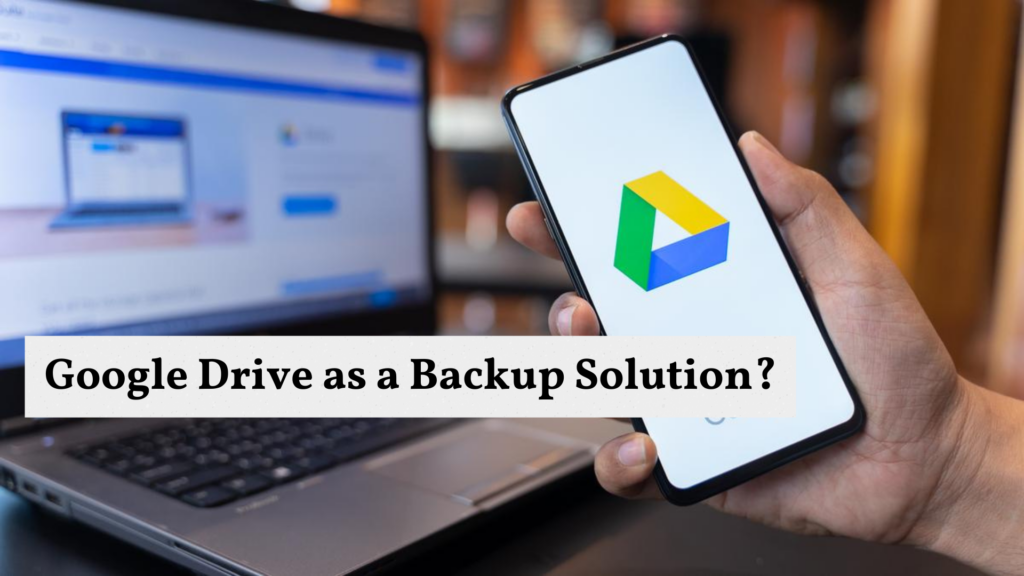- Yaman Mishra
- 0 Comments
- 2172 Views

Google Drive is a great online storage for almost everything. It offers 15 GB of free storage for every user and it keeps growing as you upload more files and photos to your Google account. However, this great service also has its limitations as a backup solution. While some services may be more accessible than others, they all can be used to store important files and documents in different locations.
A good backup solution not only stores important data but also makes it accessible from multiple devices. It’s not always ideal to rely on just one service as the primary way to backup data and keep your information safe in case of an emergency or system failure.
This article lists 5 reasons why Google drive shouldn’t be your preferred Backup solution.
Google Drive has no Encryption
If you’re using Google Drive to backup your data, you don’t get much security. If a hacker is going through your account, they’ll be able to access your files without any difficulty. This is because the service doesn’t have encryption.
Another issue with Google Drive is the fact that it has limited storage capacity. If you upload too many files and photos, they may not all fit on your device. Even if you delete some of the newer uploaded files, they might still take up space on your device or in your account’s storage.
Google Drive is generally very secure, as Google encrypts your files while they’re being transferred and stored. However, Google can undo the encryption with encryption keys, meaning that your files can theoretically be accessed by hackers or government offices.
Google privacy policy can use your data
One of the biggest concerns with Google Drive is that it uses your data to make other services more convenient and accessible. When you use a service like Google Drive, they can see what content you uploaded and what websites you visited. They also collect information about your device or account as well as how often you use them. This means that every time you use a service like Google Drive, you’re giving away some personal information about yourself that may be used for marketing purposes.
Additionally, there’s no way to completely opt out from these data mining policies because they have to comply with privacy laws. If you want more control over your data, consider using an online backup service such as AWS which doesn’t store any personal information on their servers.
Google Drive doesn’t detail its Data-centres
It’s important that you know where your data is stored in case the system fails. This means you will need to know what locations are the most secure, and which ones are the least secure. Google Drive doesn’t reveal this information to its users so it can only be guessed at by those who use their service.
Another issue with Google drive is that there isn’t any sort of encryption or even a password for your data. If someone gains access to your account, they could easily download all of your files.
Google Drive is easily susceptible to ransomware and hacking
One of the reasons why Google Drive is not a good backup solution because it’s vulnerable to cyber-attacks where hackers have access to all of your files and information. You might have been warned before that, hackers can either lock you out of all your files or cost you money in order to unlock them. It could result in losing important information or cutting off crucial online business resources like email accounts and project documents.
One of the main reasons why Google is prone to security risks is because Google stores so much connecting data and Personally Identifiable Information (PII). Because users often do not log out of their associated Google account on their browsers, their usage can often be traced back to them even with the use of VPNs.
Google’s History of Changing Privacy Policies
Google has a history of changing their privacy policies without notifying users, which can lead to a lot of confusion about what information is being shared and who will have access to it.
In 2012, Google changed their privacy policy to allow them to share personal user information across all of their services, including Google Drive. This change caused a lot of backlash from users, privacy advocates, and governments who felt that Google was not being transparent.
In addition, a Google Drive user doesn’t always use the other Google services, so it doesn’t seem fair that they would also have access to their personal data.
While Google has since clarified their privacy policy and says that they will not be sharing personal information without users’ consent, the fact that they made this change in the first place shows that they can be sneaky with how they consolidate data.